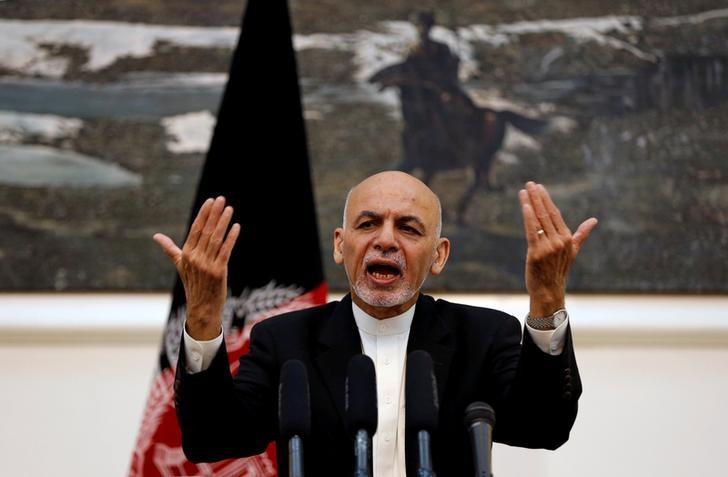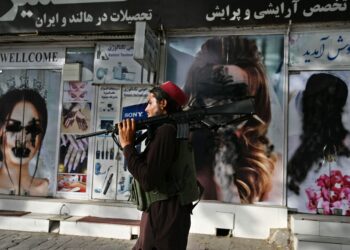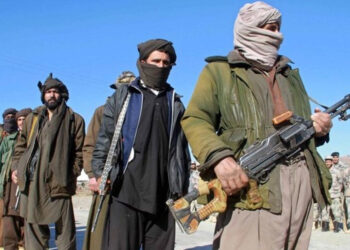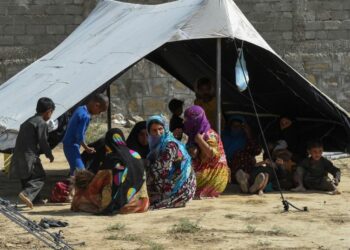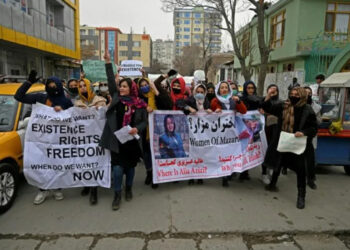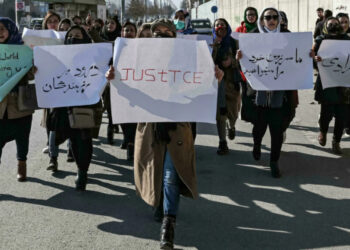A local Uzbek commander, Nizamuddin Qaisari, was arrested in Afghanistan after he allegedly threatened to kill people during a meeting between local elders and security officials on July 2. In a video of the event that was shared on social media, Qaisari says: “If the district falls to the Taliban, I will kill all of you with my own hands.” His words were directed towards the Army Chief and the Chief of the Police of the northern province of Faryab.
With these verbal threats taken at face value, as Qaisari’s arrest shows, President Mohammad Ashraf Ghani should face a similar fate. On multiple occasions, Ghani has made statements equaling a similar sentiment. The most famous one was made during the 2004 Loya Jirga, or Grand National Assembly, a mass gathering bringing together elected representatives from Afghanistan’s parliament, provincial and district councils. During this occasion, Ghani threatened Ahmad Wali Massoud, saying “either with a sword, tribal force or with foreigners’ help, I will kick you all [Tajik political leaders] out of Afghanistan.” Ghani’s verbal threat did not result in an arrest, so why was Qaisari arrested for his comments?
One could argue that Qaisari’s verbal threats echoed the local people’s unhappiness about the security forces’ consistent failing of providing the province with basic security. Qaisari’s comments could also be translated as a harsh demonstration of anger and dissatisfaction of the people of Faryab’s Qaisar district. The Faryab province has been experiencing poor security recently, and thus the security officials in that very same meeting had no response to Commander Qaisari.
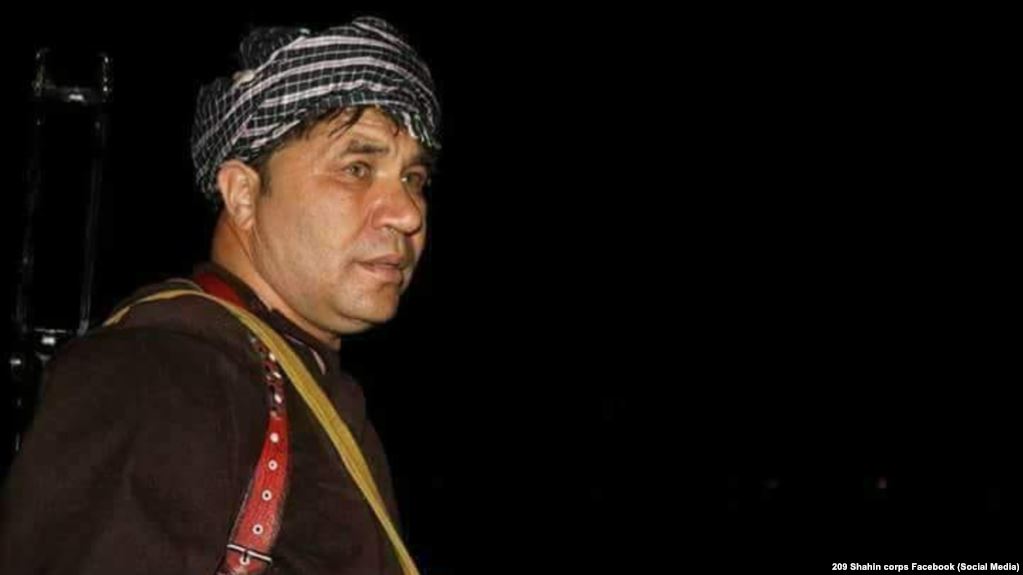
Shock and Anger Over Qaisari’s Arrest
Qaisari is not a terrorist and does not pose a threat to Afghanistan’s national and international security. On the contrary, he was fighting the Taliban and ISIS, enemies of the state, in the Faryab province. Faryab and Kabul are more than 250 miles apart, so it would be very hard, if not impossible, for Qaisari and his men to march to Kabul, break all the security checkpoints and take Ghani by his collar.
Even if Qaisari’s comments are taken at face value, the issue could have been resolved through Uzbek elders or leaders inside and outside the National Unity Government of Afghanistan. In fact, Vice President Abdul Rashid Dostum belongs to the Uzbek ethnic group. He has been forced into self-imposed exile in Turkey by Ghani in an apparent political plot, in which Dostum is accused of sexually harassing and torturing an older male political rival.
Nonetheless, Ghani and his few dogmatic ethno-nationalist supporters describe Qaisari’s arrest as “the government versus warlords.” Some of Ghani’s supporters have been actively propagating his messages via Twitter and Facebook. The discussion about Ghani’s National Security team’s inability to provide security to the Faryab province is centered around the false narrative of “technocrats versus warlords” in Afghanistan.
What was going on in Ghani’s mind that led to the arrest of Qaisari? This question should be posed to Ghani himself – a man accused of ethno-nationalism and known for a selective approach when it comes to national priorities, national security, fighting corruption, fighting his opponents, and labeling them as “warlords.” On social media platforms, any political figure that raises a voice of concern regarding Ghani’s tribal policies is labelled as “anti-state,” “corrupt” or “a warlord” by Ghani’s propagandists and “Twitter-drivers,” a group of Twitter trolls paid by government officials to silence opposite voices.
Sparking Protest
Since Qaisari’s arrest, the population of the Faryab province has been protesting non-stop, and simultaneous protests in many northern cities are still continuing. Protesters have blocked major high ways in the north, including the Salang Pass connecting northern Afghanistan with the Parwan Province.
In videos of the demonstrations broadcast by local news channels, the anger and frustration on the faces of Faryabis is clearly visible and represents their dissatisfaction and disappointment with the security situation in their province. It appears that the failure of the security forces in the north has provided a situation in which local leaders and commanders like Qaisari feel the need to stand up and provide security for their people themselves. After all, security is a matter that greatly concerns their communities in the face of increasing insecurity in the north.
One could speculate that the arrest of Qaisari was rather a personal decision by Ghani because in the video Qaisari addresses Ghani and says he will “take Ashraf Ghani by his collar to demand security and rights for his people.” Qaisari continues by saying he “lost 14 men in fighting against the Taliban” and “keeping peace” in the area under his command.
Qaisari’s comment about taking Ghani by the throat has most likely angered the president personally. Ghani is well-known for being a hot-tempered character, who is notorious among politicians in Kabul. Ali Ahmad Osmani, a former minister, recently labeled Ghani as “aggressive and impolite” and called his behavior “dictatorial.” Ghani’s anger problem might have triggered the order to arrest Qaisari without thinking of the consequences of such personal decisions.
Given the “dictatorial” behavior of Ghani, the Faryab incident may simply be a case of “President Ghani versus Commander Qaisari,” instead of “technocrats versus warlords” as pro-Ghani forces are portraying it on social media and in international media, like BBC Pashto and The Diplomat, who published opinion pieces that portray Ghani as a hero.
Other Incidents of Verbal Threats
The political arena of Kabul has witnessed numerous examples of political figures making “threatening” comments, of which one went viral on social media. Helay Ershad, a female Member of Parliament representing the Kuchis, said live on ToloTV that she “will wear a suicide vest and will carry out a suicide bombing on the Loya Jirga if anyone tries to change the constitution.” Ershad made her angry statement during a TV political debate show in response to one of the other participants who presented the view that “people of the country demand” amendments to the current constitution. In a democratic society, these comments could at least have cost Ershad her parliamentary seat, but not in Afghanistan. If the same comments were made by a non-Pashtun MP, he or she would have been forced to apologize or resign. However, since Eshrad belongs to the same tribe as Ghani, her verbal threat was ignored and condoned by the president.
So far, Qaisari’s arrest has led to demonstrations in several areas of the country by mostly Uzbeks and Farsiwans/Persian speakers. Reports of demonstrators being killed by security forces have surfaced in the media. In addition to the loss of lives after Qaisari’s arrest, it is evident that Ghani’s unilateral and personal issue can put the entire country’s unity at risk. The populations of such areas have started asking for an independent state, a wish that they have never voiced before.
Mainly non-Pashtun populations seem to condemn Qaisari’s arrest, as it is viewed as another act of tribal oppression that has taken place in Afghanistan historically. Qaisari is an anti-Taliban commander from the Uzbek community of the north and well-known for his role in fighting and causing the Taliban major harms. Qaisari’s arrest has led to the suspicion that Ghani has started to openly stand up against anti-Taliban figures and local commanders, who are actively fighting the Taliban and ISIS.
As a result, there seems to be a growing divide between the Pashtun and non-Pashtun populations in Afghanistan. Ghani appears to be using “reform” as a tool to systematically marginalize non-Pashtun political figures and label them as warlords. On the other hand, under a “peace deal” he has brought the most notorious warlords back to Kabul, including Gulbuddin Hekmatyar and his cruel commander Faryadi Sarwar Zardad – a man known for owning a “human dog” who was imprisoned in the U.K. for torture, hostage taking and crimes against humanity.
Qaisari’s arrest may be the tip of an iceberg of the major problems that Ghani’s ethnocentric policies are posing to Afghanistan. The demonstrations in the north seem to grow. For the first time, the Uzbeks, or overall Turkic community, of Afghanistan are calling for Turkistan as an independent state.
Disclaimer: The views and opinions expressed here are those of the author and do not necessarily reflect the editorial position of The Globe Post.

